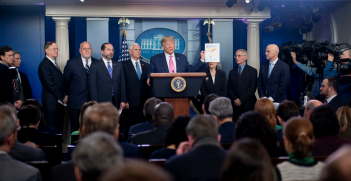Israel: Coronavirus saves Netanyahu

The collapse of Israel’s main opposition party means Benjamin Netanyahu will remain Prime Minister for at least the next 18 months. A combination of deft political manoeuvring and the current pandemic paved Bibi’s way.
The latest joke doing the rounds in Israel asks, “Who is the one person on the planet who has benefited from Coronavirus?” The answer is Benjamin “Bibi” Netanyahu.
This joke preceded the extraordinary events of yesterday, but it was prescient. Israel’s main opposition party, Blue and White, has disintegrated and its leader, Benny Gantz, is set to join Likud’s Netanyahu in a national unity government. That is despite the fact that Gantz has vowed repeatedly that he would not join forces with a political leader under indictment for corruption.
At the end of a day of political turmoil, Gantz was elected speaker of the Knesset. But that will be temporary, as he is shortly to become foreign minister in an administration headed by Netanyahu. The deal is that Netanyahyu will step down after 18 months and Gantz become Prime Minister.
Never underestimate “Bibi”
The past month has seen extraordinary ups and downs Netanyahu’s fortunes. Though his Likud party won most seats in the Knesset (parliament) elections on 2 March – increasing its tally by four to 36, compared with main opposition party Blue and White’s 33 – it soon became clear that his right-wing coalition could muster just 59 seats, two less than the 61 needed to form a coalition government.
Moreover, the mainly-Arab Joint List grouping increased its representation by two to 15, making it the third largest bloc in the Knesset and thus potential kingmaker. On 16 March, on the basis of the Joint List’s in principle support for Blue and White to form a centre-left government (the List’s primary goal is to get rid of Netanyahu), Israel’s president gave Blue and White leader Benny Gantz a four-week mandate to cobble together a majority coalition. Then things got complicated.
Firstly, Netanyahu remained caretaker prime minister, as he had been since December 2018 when he called the first of the three Knesset elections held in the past year. That gave him enormous power to dictate the political agenda – an opportunity he did not waste.
Secondly, the Coronavirus pandemic worsened exponentially in Israel during March. As of 26 March, the death toll has risen to eight and confirmed cases reached almost 2,700. As in Australia, major border restrictions and a massive lockdown are in place. The virus is reportedly spreading rapidly in both Palestinian territories in the West Bank and Gaza
The caretaker role
Adept at turning national crises to his political advantage, Netanyahu used his ongoing role as caretaker leader to appear nightly on primetime television to explain the latest steps “his” government was taking to safeguard Israelis from the worst effects of the virus. With his undoubted talent for public presentation and, as even his enemies would admit, well-honed administrative skills, Netanyahu has managed to depict himself as the only political figure capable of guiding Israel through the crisis.
At the same time, he offered Gantz equal partnership in a national unity government, with each leader to serve half a prime ministerial term – on condition that Netanyahu would hold the office first in order to maintain continuity in the virus response. What could be fairer and more statesman-like than that?
Gantz’s problem was that he did not trust Netanyahu to adhere to the bargain – not an unreasonable concern, given Netanyahu’s slippery track record over his long career. And Netanyahu’s corruption charges remained unresolved. He had been due to appear in court on 17 March to answer the three corruption charges, an event that would have attracted huge national interest, yet he managed to get his indictment off the immediate political agenda.
Corruption trial postponed
Coronavirus worked in Netanyahu’s favour. Acting Justice Minister Amir Ohana, a Netanyahu ally, said on 12 March that he would freeze court activity if necessary to slow the spread of the virus. Two days later, a district court announced (in presumed consultation with the Justice Ministry) that Netanyahu’s trial had been postponed until 24 May because of the virus risk. That date is likely to be progressively extended while the virus remains uncontrolled – not unreasonably, given huge crowds are likely in and around the court.
Netanyahu wanted parliamentary business to be postponed while he negotiated with Gantz on a unity government. Coronavirus once more came to his rescue, allowing then-Knesset Speaker Yuli Edelstein, another Netanyahu ally, to adjourn the legislature on 18 March because of the virus risk. Again, this was not unreasonable given the risk of infection – though Netanyahu’s opponents argued that the Knesset could function with electronic voting and other mechanisms that would obviate the need for full Knesset quorums.
Knesset threat
However, the major issue here was that the Knesset was a clear and present danger to Netanyahu because Gantz’s centre-left bloc, in combination with the Joint List, had the numbers to present and pass legislation that would prohibit an indicted Knesset member (MK) from forming a government. That would prevent Netanyahu becoming prime minister again – until and unless the charges against him were dismissed.
The centre-left also made clear it wanted to replace Edelstein with a more independent speaker, fearing he could use his role to frustrate anti-Netanyahu legislation. Blue and White successfully petitioned the High Court to issue a ruling that overturned Edelstein’s decision, allowing the centre-left bloc to form Knesset committees to enable the newly elected legislature to function. The court also directed Edelstein to allow the Knesset to vote on a new speaker by 25 March.
Edelstein astounded Israelis by disobeying the court. He argued that the court was interfering in the work of the legislature and resigned. At that point, with a speaker from the anti-Netanyahu forces certain to be elected in Edelstein’s place, Netanyahu looked in real trouble.
Opposition splits
But Gantz had problems of his own. To form a government, Gantz needed a guarantee of voting support in the Knesset from the Joint List. The List would probably have provided this, though it would almost certainly not join his coalition.
There was a precedent for this. Former Labor Party leader Yitzak Rabin negotiated a voting support agreement with two Arab parties when forming a government in 1992. But Israeli politics has moved rightward since then, and some Jewish nationalist members of Gantz’s bloc strongly opposed relying on Arab votes. Netanyahu, in public comments over many months, encouraged this hostility by regularly castigating Arab Israelis as disloyal to Israel – and Gantz as equally disloyal if he used their votes to form a government.
Finally, it seemed Gantz had little choice. If Netanyahu could prise even two Blue and White MKs from the centre-left bloc, he would be able to form a government in his own right. So yesterday Gantz set aside his misgivings and agreed to join a unity government on Netanyahu’s terms.
The new government’s majority is still unclear. But sufficient former members of Blue and White are likely to come across with Gantz to give Netanyahu a stable coalition of over 70. Netanyahu appears to have come out on top again. But given the volatility of Israeli politics, we could yet have more surprises.
Ian Parmeter worked for 37 years in the Department of Foreign Affairs and Trade, the Department of the Prime Minister and Cabinet, and the Office of National Assessments. He is currently a Research Scholar at the Centre for Arab and Islamic Studies, Australian National University.
This article is published under a Creative Commons Licence and may be republished with attribution.





